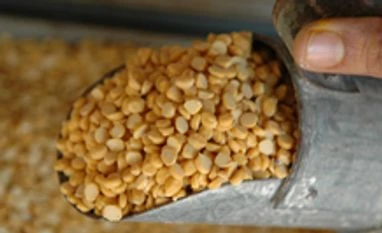The Centre today said action against hoarders and black-marketers has been stepped up and the state governments have seized over 5,800 tonnes of pulses in five states over the last few months.
The claim came on a day that the issue of pulses entered the political arena of Bihar. On Monday, Janata Dal (United) leader and Bihar Chief Minister Nitish Kumar blamed the central government for making pulses, "the poor man's meat", prohibitive for the common man and taunted Prime Minister Narendra Modi on earlier statement in relation to corruption "na khuanga na khane doonga (neither will I indulge in corruption nor allow others)".
Today, two central ministers, including Agriculture Minister Radha Mohan Singh, blamed Kumar-led Bihar government for the decline in production of pulses. Singh said the Centre wrote six letters to state governments, including Bihar, to take benefit of the 'Price Stabilisation Fund' to sell pulses at cheaper rates. He said the "politically motivated" Kumar government deliberately did not utilize the fund while Andhra Pradesh, Telangana, Delhi and West Bengal utilized the fund to sell pulses at Rs 120 to Rs 130 through retail outlets. The fund is raised by each state to which the Centre contributes 50 per cent of the money.
Food Minister Ram Vilas Paswan alleged that the Bihar government did not take appropriate steps to contain prices of pulses only to "sully" the image of the Modi government. He said the Bihar government didn't convey the state's requirement when the Centre planned to import pulses.
Kumar hit back saying how people wanted their "purane din" or old days back. "Why is it that not just Bihar, but pulses are selling for Rs 200 per kilogram in Gujarat, Maharashtra and Madhya Pradesh," he asked. The three states are ruled by BJP governments.
Cabinet Secretary Pradeep Kumar Sinha today reviewed the prices, production, procurement and availability of pulses in a meeting with secretaries of Consumer Affairs, Agriculture, Commerce and other ministries. "We had directed state governments to enforce the Essential Commodities Act more stringently. As a result, some state governments have carried out surprised inspections and seized large quantities of pulses," Consumer Affairs Secretary C Vishwanath said.
More From This Section
According to the Consumer Affairs Ministry, over 5,800 tonnes of pulses have been seized in five states in the last few months.
Of the entire amount, 2,549 tonnes have been seized from Telangana, 2,295 tonnes from Madhya Pradesh, 600 tonnes from Andhra Pradesh, 360 tonnes from Karnataka and 10 quintals from Maharashtra, the ministry's data showed.
"Raids are being carried out even today at places like Mysore and Gulbarga in Karnataka and also in Tamil Nadu. These measures have started showing results," Vishwanath said. The government expects its measures would improve supply of pulses and moderate prices.
Besides de-hoarding measures, state governments have started withdrawing stock holding limit exemptions given to pulse importers, exporters, licensed food processors and large departmental retailers, following the central government's direction.
The Congress also raised questions on the policies of the Modi government to tackle the skyrocketing prices of pulses.
Retail prices of tur dal today rose further to touch Rs 210 per kg, urad rates increased to Rs 198 per kg, moong at Rs 135, masoor Rs 120 and gram (chana) Rs 84 per kg in the retail market today. Prices have shot up due to fall in output by two million tonnes in the 2014-15 on deficient and untimely rains.
To control skyrocketing prices, the Centre has taken several measures such as creating a buffer stock of 40,000 tonnes, sale of imported pulses at cheaper rates and imposition of stock limits on traders as well as departmental stores, licenced food processors, importers and exporters.
"All of these measures are expected to improve supply position and arrival of pulses in the market thereby moderating the prices of pulses," an official statement said.
)